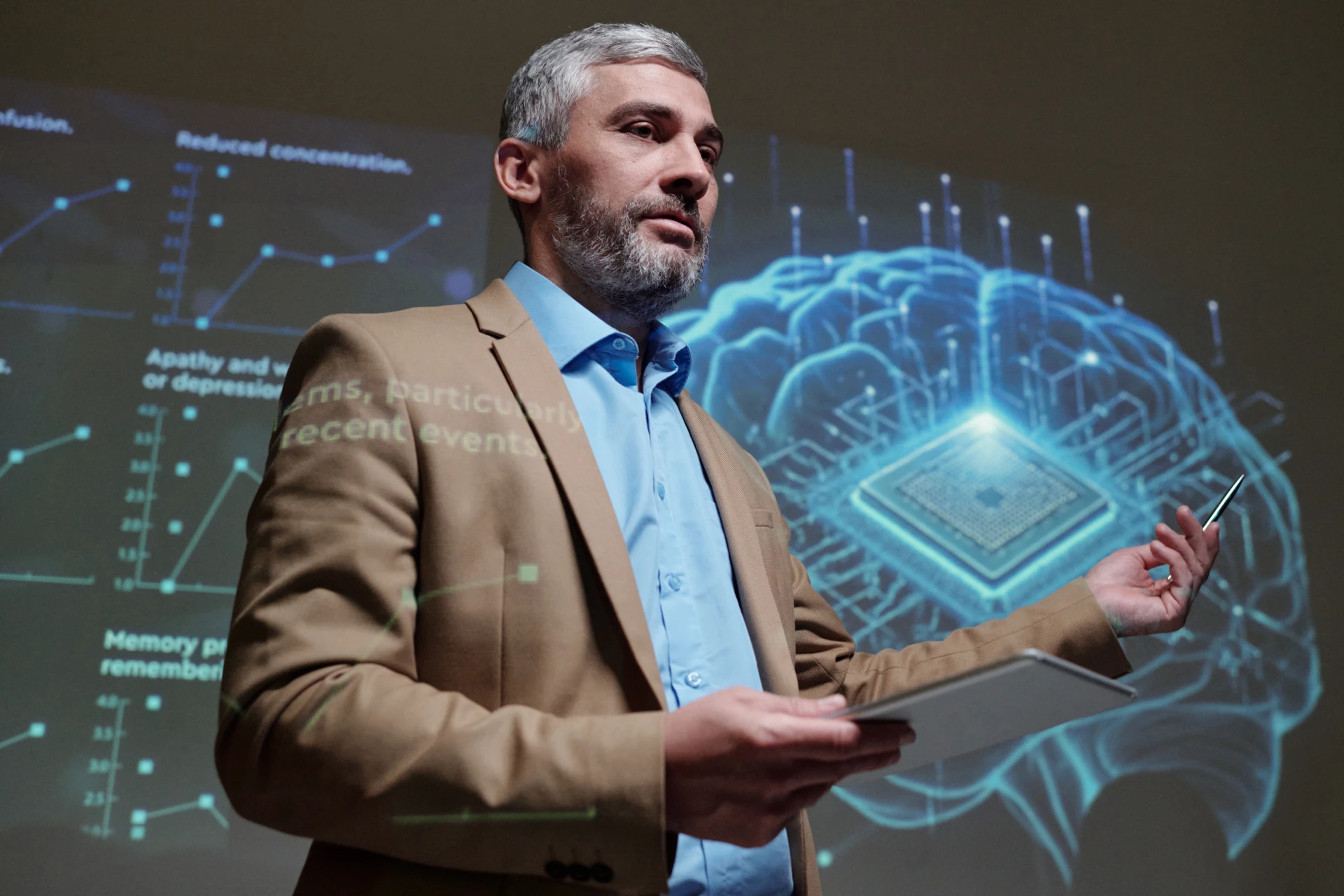Deep learning, a subset of machine learning, is rapidly transforming industries worldwide. While the term might sound complex and intimidating, deep learning is fundamentally about enabling computers to learn from vast amounts of data in a way that mimics the human brain. For UK businesses, understanding and implementing deep learning can unlock significant competitive advantages, drive innovation, and improve operational efficiency.
This comprehensive guide aims to demystify deep learning, providing a practical overview of its core concepts, key applications, and benefits for UK businesses. We’ll explore how deep learning algorithms are used in image recognition, natural language processing, and predictive analytics, and explain how Pinnacle Future can help your team gain the skills needed to leverage this powerful technology.
Understanding Deep Learning: Beyond the Buzzwords
Deep learning is a type of machine learning that uses artificial neural networks with multiple layers (hence the term “deep”) to analyse data and extract complex patterns. These neural networks are inspired by the structure and function of the human brain, allowing computers to learn from large datasets without explicit programming.
Here’s a breakdown of the key concepts:
- Neural Networks: Artificial neural networks are interconnected networks of nodes (neurons) that process information. Each connection between neurons has a weight associated with it, which determines the strength of the connection.
- Layers: Deep learning models have multiple layers of neurons, allowing them to learn hierarchical representations of data. The first layers might learn simple features, while the later layers learn more complex features.
- Training: Deep learning models are trained using large datasets. The model adjusts the weights of the connections between neurons to minimise the difference between its predictions and the actual values in the dataset.
- Algorithms: Various algorithms, such as backpropagation and gradient descent, are used to train deep learning models.
Unlike traditional machine learning algorithms that require manual feature engineering (i.e., identifying and extracting the most relevant features from the data), deep learning models can automatically learn features from raw data. This makes deep learning particularly well-suited for complex tasks such as image recognition and natural language processing.
Why Deep Learning Matters to UK Businesses
Deep learning offers a wide range of benefits for UK businesses across various industries. By leveraging deep learning, companies can:
- Improve Accuracy and Efficiency: Deep learning algorithms can often achieve higher accuracy and efficiency than traditional machine learning methods, leading to better decision-making and improved operational performance.
- Automate Complex Tasks: Deep learning can automate tasks that were previously too complex or time-consuming for humans or traditional automation systems.
- Gain a Competitive Advantage: By leveraging deep learning, companies can develop innovative products and services, improve customer experiences, and gain a competitive edge in the marketplace.
- Unlock New Insights: Deep learning can help businesses uncover hidden patterns and insights in their data, leading to better understanding of their customers, markets, and operations.
- Reduce Costs: By automating tasks and improving efficiency, deep learning can help businesses reduce costs and improve profitability.
For UK businesses looking to innovate, improve efficiency, and gain a competitive advantage, deep learning is a technology that cannot be ignored.
Key Applications of Deep Learning for UK Businesses
Deep learning is transforming industries across the UK, with applications ranging from finance and healthcare to manufacturing and retail. Here are some of the most impactful applications:
1. Image Recognition: Automating Visual Tasks
Image recognition is a key application of deep learning, enabling computers to “see” and interpret images. This has numerous applications for UK businesses:
- Manufacturing: Deep learning can be used for quality control, identifying defects in products with greater accuracy than human inspectors.
- Retail: Deep learning can be used for visual search, allowing customers to find products by uploading images. It can also be used for inventory management and security surveillance.
- Healthcare: Deep learning can analyse medical images to detect diseases such as cancer and Alzheimer’s disease.
- Security: Deep learning can be used for facial recognition and object detection in security systems.
- Autonomous Vehicles: Deep learning is crucial for enabling self-driving cars to perceive their environment.
By automating visual tasks, deep learning can improve efficiency, reduce costs, and enhance safety.
2. Natural Language Processing (NLP): Understanding and Generating Text
Natural Language Processing (NLP) is another key application of deep learning, enabling computers to understand and generate human language. This has numerous applications for UK businesses:
- Customer Service: Deep learning can power chatbots that provide instant answers to customer queries, improving customer satisfaction and reducing support costs.
- Sentiment Analysis: Deep learning can be used to analyse customer reviews and social media posts to understand customer sentiment and identify areas for improvement.
- Content Creation: Deep learning can be used to generate content, such as articles, product descriptions, and marketing materials.
- Language Translation: Deep learning can be used for accurate and efficient language translation.
- Spam Detection: Deep learning can be used to filter spam emails and messages.
By enabling computers to understand and generate human language, deep learning can improve communication, automate tasks, and enhance customer experiences.
3. Predictive Analytics: Forecasting Future Trends
Predictive analytics uses historical data to predict future outcomes. Deep learning can enhance predictive analytics by identifying complex patterns in data that traditional methods might miss.
- Finance: Deep learning can be used to predict stock prices, detect fraud, and assess credit risk.
- Retail: Deep learning can be used to forecast demand, optimise pricing, and personalise marketing campaigns.
- Manufacturing: Deep learning can be used to predict equipment failures and optimise production schedules.
- Healthcare: Deep learning can be used to predict patient outcomes and identify individuals at risk for developing certain diseases.
- Supply Chain Management: Deep learning can optimise logistics, predict delays, and manage inventory more effectively.
By enabling more accurate predictions, deep learning can help businesses make better decisions, improve efficiency, and reduce risks.
4. Fraud Detection: Protecting Businesses from Cybercrime
With the increasing sophistication of cyber threats, deep learning provides advanced capabilities for detecting and preventing fraud.
- Real-time Transaction Analysis: Deep learning models can analyse financial transactions in real-time to identify suspicious patterns indicative of fraud.
- Anomaly Detection: Deep learning algorithms can detect unusual activities that deviate from normal user behaviour, flagging potential security breaches.
- Enhanced Cybersecurity: Deep learning can improve threat intelligence, detect malware, and strengthen overall cybersecurity measures.
By providing robust fraud detection mechanisms, deep learning protects businesses from significant financial losses and reputational damage.
Getting Started with Deep Learning: A Practical Approach
Implementing deep learning can seem daunting, but with the right approach, it can be a manageable and rewarding process. Here are some practical steps for UK businesses:
- Identify a Business Problem: Start by identifying a specific business problem that deep learning can help solve.
- Gather Data: Collect and prepare the data needed to train your deep learning model. Ensure that the data is clean, accurate, and relevant to the problem you’re trying to solve.
- Choose a Deep Learning Framework: Select a deep learning framework such as TensorFlow, PyTorch, or Keras. These frameworks provide the tools and libraries needed to build and train deep learning models.
- Build and Train Your Model: Build and train your deep learning model using the chosen framework and your prepared data.
- Evaluate Your Model: Evaluate the performance of your model and fine-tune it as needed.
- Deploy Your Model: Deploy your model into production and monitor its performance over time.
For many UK businesses, partnering with an experienced AI consultancy like Pinnacle Future can significantly accelerate the deep learning adoption process.
The Role of Pinnacle Future: Empowering Your Deep Learning Journey
Pinnacle Future is a leading provider of AI training and consultancy services, helping UK businesses harness the power of deep learning to achieve their goals.
Deep Learning Training Programmes
We offer a range of deep learning training programmes designed to equip your team with the skills needed to build and deploy deep learning models effectively. Our training programmes cover topics such as:
- Introduction to Deep Learning: A foundational course covering the basics of deep learning.
- Deep Learning with TensorFlow: A hands-on course teaching how to use TensorFlow to build and train deep learning models.
- Deep Learning with PyTorch: A practical course on using PyTorch to develop deep learning applications.
- Advanced Deep Learning Techniques: A course covering advanced topics such as convolutional neural networks (CNNs) and recurrent neural networks (RNNs).
Our training programmes are delivered by experienced AI experts and can be tailored to meet the specific needs of your organisation.
Deep Learning Consultancy Services
We also offer a range of deep learning consultancy services to help UK businesses implement deep learning solutions effectively. Our consultants have deep expertise in deep learning and can provide guidance on:
- Deep Learning Strategy Development: Developing a deep learning strategy that aligns with your business goals.
- Data Preparation and Management: Ensuring that you have the data infrastructure and governance in place to support deep learning initiatives.
- Model Building and Training: Building and training deep learning models tailored to your specific needs.
- Model Deployment and Monitoring: Deploying and monitoring deep learning models in production.
We work closely with our clients to understand their unique challenges and develop customised deep learning solutions that deliver tangible results.
Overcoming Challenges: Ethical Considerations and Data Privacy
As with any powerful technology, deep learning presents certain challenges and ethical considerations. It’s crucial for UK businesses to address these proactively.
- Data Bias: Ensure datasets are diverse and representative to avoid skewed or discriminatory outcomes.
- Transparency and Explainability: Strive for models that are interpretable, allowing for understanding of decision-making processes.
- Data Privacy: Adhere to GDPR regulations and implement robust data security measures to protect sensitive information.
- Ethical Frameworks: Develop and enforce ethical guidelines for the development and deployment of deep learning applications.
Addressing these challenges ensures that deep learning is used responsibly and ethically, promoting trust and long-term sustainability.
The Future of Deep Learning: UK Businesses Leading the Way
Deep learning is a rapidly evolving field, and the future holds even more exciting possibilities. As the technology matures, we can expect to see:
- Increased Automation: Deep learning will automate even more complex tasks, freeing up human workers to focus on more creative and strategic activities.
- More Personalised Experiences: Deep learning will enable businesses to deliver highly personalised experiences to their customers.
- New Discoveries and Innovations: Deep learning will accelerate the pace of scientific discovery and innovation across various industries.
UK businesses that embrace deep learning now will be well-positioned to lead the way in this exciting new era.
Final Thoughts: Embracing the Deep Learning Revolution
Deep learning is a powerful technology that has the potential to transform UK businesses across various industries. By understanding the core concepts, identifying key applications, and partnering with experts like Pinnacle Future, you can unlock the full potential of deep learning and gain a significant competitive advantage. Don’t be intimidated by the complexity – embrace the deep learning revolution and position your business for success in the years to come.









